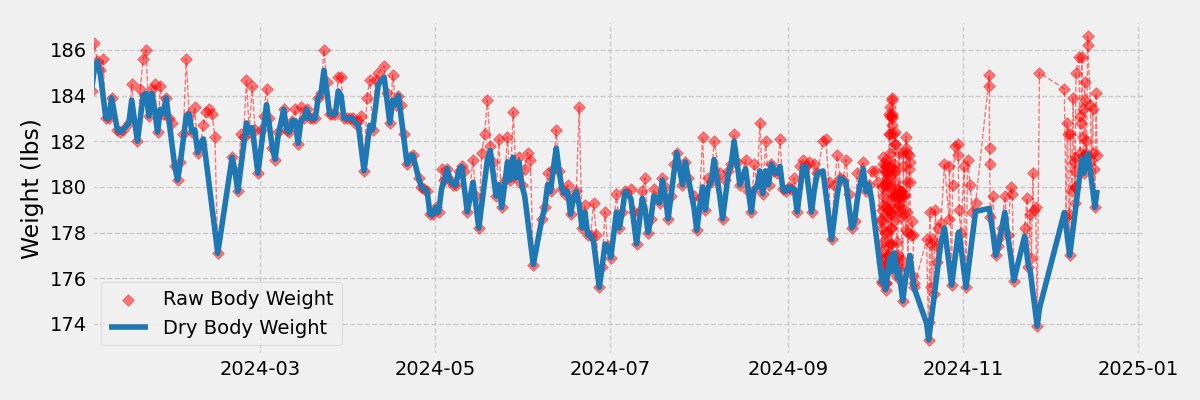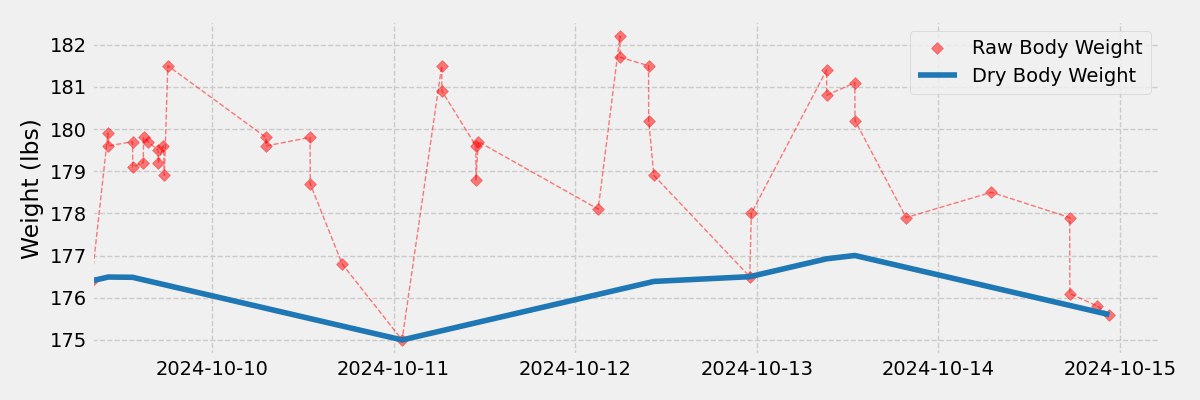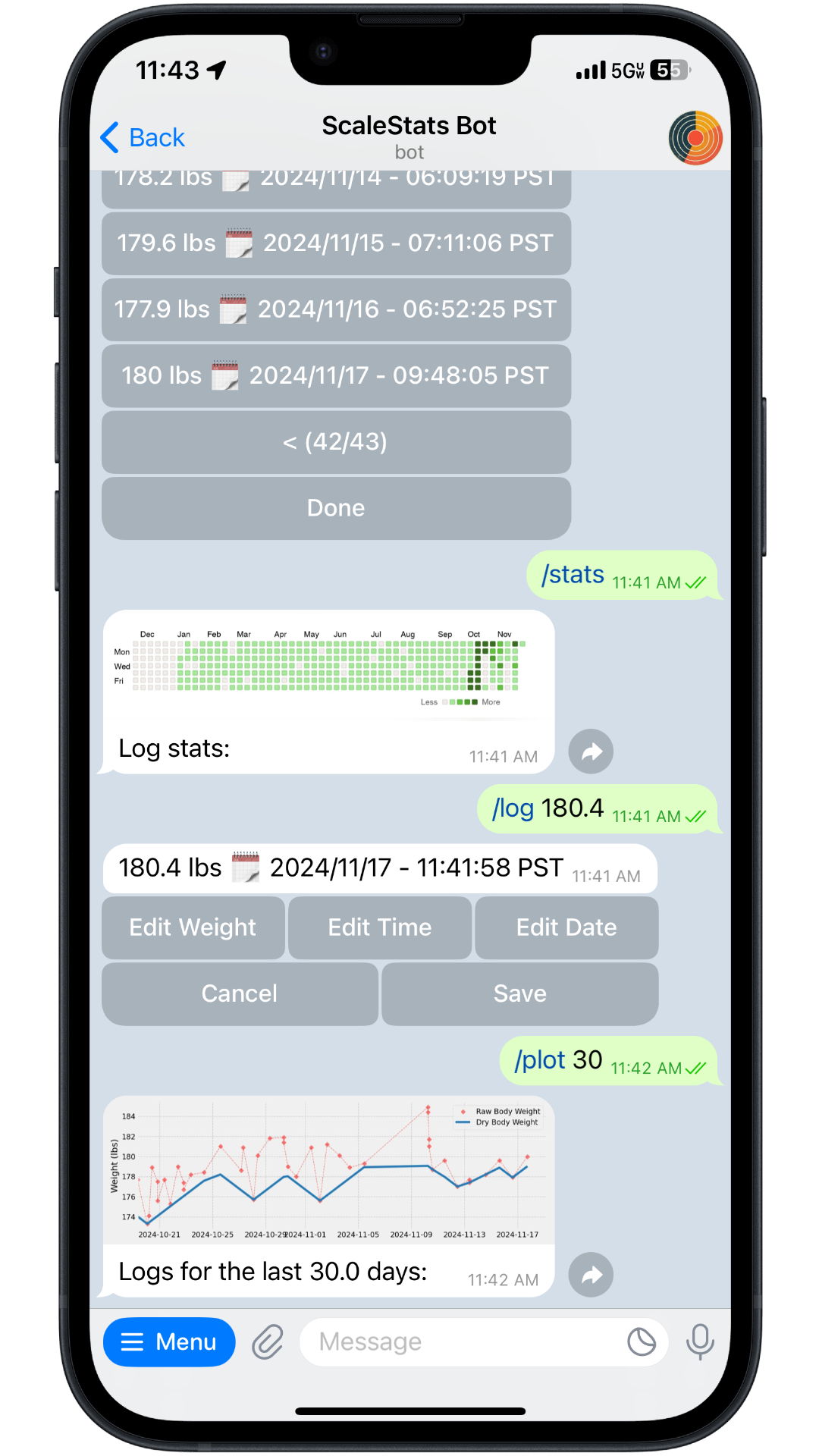Scale Stats

My daily body weight for 2024 (so far), plotted using Scale Stats.
I've been weighing myself daily for over 4 years (only lapsing during bouts of travel where packing a bathroom scale is impractical). Through this practice, I've learned both a great deal about myself and nothing at all.
I've learned about the effects of daily activities (exercise, what you eat, bowel movements, etc.) on your body's weight. And in turn, I've learned about how all of these factors affect how it feels, and in turn how that feeling correlates to the number of the body scale. I've seen that after a few days of consistent eating, I can more or less predict my body weight to within 0.2 lbs at any point throughout the day based on feeling alone.
And I've also learned that all of this is meaningless. Because I've seen my body weight fluctuate by nearly 10 lbs within one 24 hour timespan.
Like most people, I've had my bouts with weight loss after packing on unecessary pounds through less than healthy eating habits, and when I finally had enough and started controlling both what I eat and when I eat it, I started to measure my body weight every day, unsure of what story the numbers might tell.
And through this practice, I came to rediscover what millions of people across the world already knew, that the body weight scale can be cruel and deceiving. That three days of rote adherence to a strict diet and workout routine do not necessarily translate to weight lost on the scale. To those desperately hoping to receive validation from the bathroom scale by seeing that number go down by 0.1 lbs to reflect the effort they've put in, I'm sorry to say that your bathroom scale won't give it to you.
What is body weight?
Body weight is a touch more complicated than it appears on the surface, because when you step on the scale, it's not just you, it's everything you're carrying. Whether dressed or undressed, fresh after a meal, or fresh after a shower, your bathroom scale measures it all. And it turns out that the amount of "stuff" we carry at any point in time fluctuates quite a bit. For example, drink a 16oz cup of water and your body weight will increase by 1 pound. In the same vein, all of the food you eat, going to the bathroom, how much you sweat, all plays into the moving variable that is your "body weight". And all of these variables are far more volatile than the number you actually care about: the pounds of body fat in your body.
Approach
Given all of the uncertainty, I wanted to see if I could do something about it. The mission objective: Given what we know about the physiological limits about how body fat content in the body do (and don't) change, can we apply statistical approaches to better approximate the true body fat we're carrying at any given point in time?
As an example, there's an oft-quoted but misleading claim that eating an excess of 3500 calories above your daily energy expenditure will lead to 1 lb of weight gain1. Even if this claim holds true for the first 3500 calories, it cannot be true for the next 3500 calories, nor the 3500 calories after those. Our body is a bag a biochemical reactions and there must be an upper limit to the number of calories our body can absorb through our digestive tract and convert into fat in a single day. There must be a calorie speedlimit, past which calories simply pass through our digestive tract unobsorbed. The process of burning fat is yet another biochemical reaction, and there too must be an upper theoretical limit that places strict bounds on how quickly we can burn body fat. This insight gave me a starting point.
From first-hand experience, I know that my body weight fluctuates on average about 5 lbs (peak-to-peak) in 24 hours. However, most of those fluctuations are due to water and food weight. From the assumption that our true "dry" body weight (skeletal mass + organs + lean mass + fat content) changes much slower, I put forth the assumption that our true "dry" body weight can change at no more than 1 pound per 24 hour period. With this simplistic linear assumption alone, we can actually make some useful claims about the theoretical limits of our true dry body weight at any given point in time.
If you weigh yourself in the morning (say 7 AM), you get a number that's typically on the lower end of your daily weight range. If you then weigh yourself after dinner (~7 PM), and now weigh 5 lbs more, the linear extrapolation of your morning's weight to the time of your afternoon weigh-in (~7 PM) says that your true "dry" body weight can't actually have changed by more than:
Therefore, even though your bathroom scale claims you gained 5 lbs in 12 hours, the assumption given above dictates that you gained no more than 0.5 lbs of body fat, and that the discrepancy (4.5 lbs) must be due to transient weight you're carrying (as fluid, waste products, whatever).
I found this application so fun, that for a few days I set out to weigh myself after every activity that might affect my body weight. Drink a glass of water? Weigh in before and after. Go to the bathroom? Ditto. It was awesome to see that, though my measured body weight fluctuated violently, my predicted dry body weight staid dutifully cognizant of the biological speed limits of how quickly our true "dry body weight" can change.

An example plot showing 40+ body weight measurements across 6 days. Note the steep jumps and drops.
The red points denote my actual raw body weight measurements. The sharp changes in the red plot denote activities that impacted my raw measured body weight. Note that across these 6 days, my measured body weight ranged from ~175 lbs to ~182 lbs. Quite a large range, no wonder losing 0.1 lbs of body fat will never show up on a body weight scale (assuming that body weight scales were even that precise).
The real kicker from this plot, however, is the blue line. The blue line follows the general trends (both upward and downward), but must obey the biological speed limits at which we may gain or lose body fat (1 lb in 24 hours). It doesn't matter what the body weight scale says, the blue line predicts a theoretical maximum for your true body weight.
Telegram Bot
After playing around with this concept for a few days, I decided to turn it into a telegram bot for rapid logging and to make it available more broadly, and have included a few additional bells and whistles.

The ScaleStats telegram bot.
On top of having the ability to both import and export CSVs of your logged data (hurray for keeping your own data), I've also implemented the infamous github contributions chart to at-a-glance visualize which days you've logged body weight in the past year. This tool is incredibly useful to help motivate you to be consistent and great to for verifying that imported CSVs imported correctly.

Chart that denotes which days in the past year you've logged your body weight for. (A-la Github contributions chart)
Conclusion
If you found this concept fascinating, I suggest you give it a shot. It's actually pretty fun to closely track your body weight for a few days, even if it's unsustainable over the long term. I'm sure you'll learn a lot about yourself.
Notes:
-
I have my doubts about this claim, but I think it's a good introduction to the kind of thinking you need to have about calories in with respect to weight loss. ↩